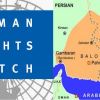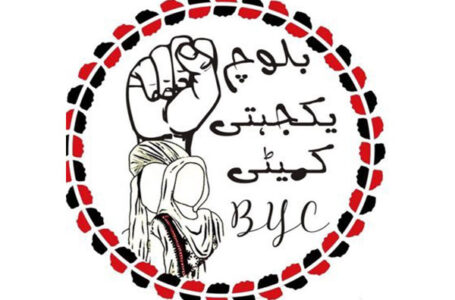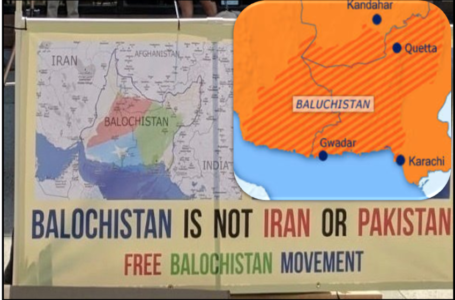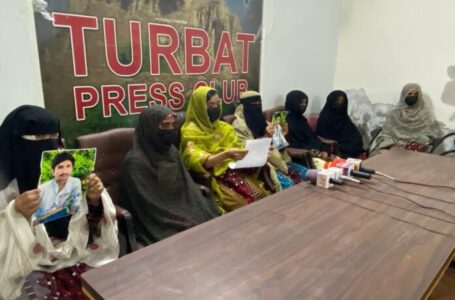Balochistan: Pakistani Forces’ Ration Supply Confiscated in Kulbar
HRW annual report and Human Rights violations in Balochistan

Pakistan has been committing Human Rights violations in Balochistan since 1948 when a brigade of Pakistan army on the order of Mohammad Ali Jinnah (widely known as Jinnah) has attacked the fort of Kalat – the then capital of Balochistan. Since the occupation the basic Human Rights violation in Balochistan mostly went unnoticed due to Pakistan military’s embargo on international and Pakistani media and lack of modern communication system in Balochistan. However, the emergence of social media which is used an alternative media world wide – especially in occupied territories where states’ media tend to ignore the struggle and resistance of indigenous people. In case of Balochistan the Pakistani media has always twisted the historical facts and portray the Baloch struggle for national liberation as a struggle for greater share in resources and autonomy.
The crimes against humanity and war crimes that Pakistan military has been committing in Balochistan include indiscriminate bombardment of civilian populations, arbitrary arrests, attacks on peaceful protests, extra-judicial abduction of Baloch political prisoners, target killing of most learned and educated members of Baloch society and abduction of thousands of Baloch activists. The medium of punishment the Pakistani army adopted is one of the most gruesome and height of savagery that includes inhuman torture and humiliation, degradation of political prisoners, slashing thighs, chest and other body parts of prisoners’ bodies and rubbing salt and chilli powers on their wounds, drilling, sleep deprivation and even in some cases the Pakistan military used oiled and greased sticks to rape political prisoners which is one of the most humiliating methods and a crime that should never be pardoned.
The latest policy of state “abducted, kill and dump” has become almost a daily practice of Pakistani forces. This policy of eliminating Baloch prisoners started from July 2010 onwards and under this inhuman act the state forces abducted Baloch activists, subject them to torture and eventually kill them in their captivity and dump their mutilated bodies in a roadside or a desolated area. Many of Baloch political prisoners were thrown down from helicopters while they were still alive. The other methods of collective punishment include burning standing crops, killing livestock (especially the camels and donkeys) which are used as sources of transportation in rural areas of Balochistan.
The illegal occupation of Balochistan is one of the most basic Human Rights violation where Pakistan has deprived an entire nation of its right to freedom and liberty. The Baloch people been peacefully resisting the forced occupation of their country on the ground and on international level pro-freedom Baloch organisations and activists have been spreading awareness about Pakistan’s Human Rights violations in Balochistan. They [Baloch activists] have been appealing United Nations and other international Human Rights organisations and non-governmental bodies to intervene in Balochistan on humanitarian basis to stop the ongoing Human Rights violations there.
In recent past the United Nations (WGEID), Amnesty International, Asian Human Rights Commission, Human Rights Commission of Pakistan and Human Rights Watch reported extensively on Human Rights violations in Balochistan and in their reports they described Balochistan as one of the worst places with regards to Human Rights violation – they put the blame on Pakistani security forces including FC, army and intelligence agencies such as ISI for the ongoing violation of Human Rights including enforced-disappearances and the kill and dump policy – dubbing such actions as Pakistan’s dirty war in Balochistan.
In January this year the HRW (Human Rights Watch) published its annual report 2014 where it briefly mentioned Balochistan in Pakistan’s section of the report.
The HRW is a New York based international non-governmental organisation which investigates the reports of Human Rights violations around the world and compiles its annual report. The HRW’s objective to compile reports of Human Rights violations is to bring them to the attention of media in its efforts to build pressure on those groups and governments that are involved in crimes and Human Rights violations. The reports of HRW have international significance and authenticity.
Human Rights Watch was established in 1978 under the name of a non-governmental organisation ‘Helsinki Watch’. The aim of Helsinki Watch was to investigate and publically report abusive policies of governments of former Soviet Union but later it made further braches such as American Watch, Asia Watch, African Watch and Middle East Watch. However, in 1988 it dissolved and amalgamated all these committees to form Human Rights Watch (HRW).
The Human Rights Watch report released in 2015 is its 25th annual report which reviewed the state of Human Rights in around 90 countries of world and presented a summary of Human Rights violations. The report top priority to the activities of the ‘Islamic State (IS)’ or ISIS, China’s attacks on Uyghur population in Xinjiang region and the crimes of drug mafia groups in Mexico. This report also contains a short but comprehensive mention of ongoing Human Rights violation in Balochistan which reads a following:
“The human rights situation in Balochistan remained abysmal. Despite the May 2013 election of a civilian government, the military has retained all key decision making functions in the south-western province and blocked efforts by civil society organizations and media to cover ongoing violence there.
Enforced disappearances linked to the security forces continued with impunity. On March 18, plainclothes gunmen later identified as belonging to Pakistan’s paramilitary Frontier Corps allegedly abducted Zahid Baloch, chairperson of the Baloch Student Organization-Azad in the provincial capital, Quetta. Baloch’s whereabouts and safety remained unknown at time of writing. Despite rulings from the Pakistan Supreme Court in 2013 demanding justice for victims of enforced disappearances, as well as recommendations from the UN Working Group on Enforced or Involuntary Disappearances in 2012, Pakistan’s government has failed to meet its obligations under the constitution and international law prohibiting enforced disappearances.”
The HRW report also condemned the ‘Protection of Pakistan Ordinance’ and attacks against Shia Hazara community in Balochistan. The report have linked the attacks against Hazaras to Pakistanis security forces in these words; “The militant group Lashkar-e-Jhangvi (LeJ) continued attacks on Shia Hazaras in Balochistan. The government failed to successfully prosecute and imprison suspects, in part due to sympathy for the group within the security forces.”
Pro-freedom organisations in Balochistan have welcomed the HRW report but at the same time they demanded from the Human Rights Watch to investigate the issue of discovery of mass graves in Tootak area of Khuzdar Balochistan and continuous shelling of civilian populations by Pakistani forces. Baloch pro-freedom parties and leaders said even though the HRW’s annual report and inclusion of Balochistan is praiseworthy but the situation of Human Rights in Balochistan is far worse than what has been briefly mentioned in the report.
It is now an open secret that Pakistani military and intelligence agencies are involved in crimes against humanity in Balochistan and the International Community and International Human Rights Organisaitons instead of expressing concern should take practical steps to stop the slow motion genocide of Baloch people by Pakistan.










